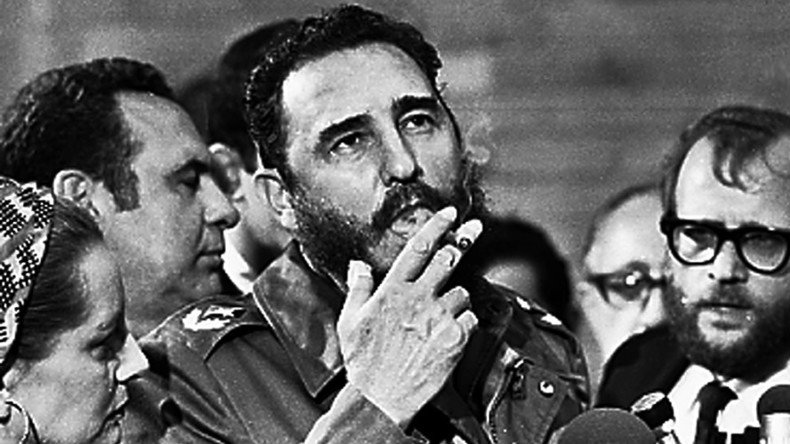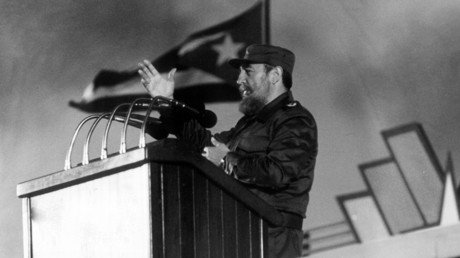Fidel’s death: New round of US vs. Cuba political football, or The End?

One of the world’s most iconic figures, Cuba’s former president and leader of the Cuban revolution, Fidel Castro, died Friday at the age of 90. RT contacted political analysts and experts on Castro’s legacy, the country’s future, and the prospects for US-Cuba relations.
READ MORE: Fidel Castro, Cuba’s longtime leader, dies at 90
Commenting on the future of relations between Havana and Washington after the death of Fidel Castro, investigative journalist Patrick Henningsen said that, “Cuba has always been a political football in the US over the last few decades.”
“In terms of Donald Trump coming into power – he won the state of Florida, one of the great bombs that Donald Trump had electorally was a good chunk of the Cuban Latino vote in Florida … and these are all people that would oppose normalization with the Communist government in Cuba,” Henningsen continued, “so again, this pushing ... on both sides with the Republican administration, you definitely see more resistance to that mainly because of the lobby and the electorate that represents the old guard who had fled Cuba in the late 1950s, who were displaced by the revolution.”
The issue of Guantanamo Bay is the “other political football with Cuba,” according to Henningsen. “In terms of the Republicans or people who are big on national security, this sort of lobby – the neoconservatives, war hawks – they would see Guantanamo Bay as an asset that they do not want to give up, and of course this is going to be always a bone of contention going forward into the future, as essentially taken by the US from Cuba, and should have been returned a long time ago.”
In terms of trade relations with the US, Henningsen believes Cuba is going to be “gradually opening as a natural process of globalization” but at the same time its own culture will be coming “out of the shadows.”
“This has been quite a long time in terms of trade embargos and sanctions. This is all loosening up now and you want to see a lot more exchanges and Cuba coming closer to the US in that sense. And also playing a bigger role in the world … Cuba will be more visible, Cuban culture will be more visible.”
Sreeram Chaulia, Professor and Dean of Jindal School of International Affairs, said Castro has outlived many US presidents who wanted to topple him and “had the last laugh.”
“If you see from Kennedy to Obama, he outlived many presidents who tried to overthrow him, and eventually Obama's initiative ... for relaxation of many of the restrictive regimes and practices that the US had imposed. The trade embargo indeed has not been removed, but that requires US Congressional intervention. I think inch by inch, as he grew older, Fidel as a grand old man, revolutionary of Latin America, ultimately succeeded in chipping away at the American decisions,” he added.
“I think now the question remains how the Trump administration will take it forward, but to a great extent, at the grand old age of 90 ... he would have been satisfied that ultimately he was proven right that this policy of trying to isolate Cuba had failed on the part of the US, and Cuba survived, Cuba thrived, Cuba built relations with the rest of the world, and ultimately showed how unjust and unfair 'the American empire,' as Fidel used to call it, was.”
Fidel Castro will be remembered as a positive figure in the history of international relations, Stelios Kouloglou, a Greek journalist and Member of the European Parliament, told RT, stressing that Castro became the leader of a small Caribbean island nation and both “managed to improve the living standards of the people” and made his country significant in the international arena.
Cuba is a small island, so “we have to compare it not with Miami, the US or Europe but with other Caribbean states such as Haiti. From this point of view Cuba is much better off,” Kouloglou said, adding that Castro “inspired a lot of movements for social justice in Latin America” and he “still remains and will be an inspiration.”
There would be a gradual lessening of American hostilities towards Cuba, believes war correspondent and columnist Eric Margolis.
“Business is playing a major role,” Margolis told RT. “There’s vast amounts of American money that want to be invested in Cuba, which badly needs its tourist trade refreshed. Cuba is going to be swamped by American tourists. They already can’t get hotel rooms there. I think this whole overlay of Cold War hostility will gradually ebb away.”
The statements, views and opinions expressed in this column are solely those of the author and do not necessarily represent those of RT.













